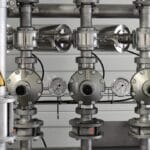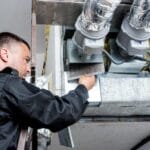Replacing an aging water heater is an inevitable home maintenance task, but understanding the real costs is crucial. This blog post dives deep into the factors influencing water heater prices – from the type (tank vs tankless), size, energy efficiency, installation requirements, brand, and warranty. We’ll examine upfront costs for various models like gas, electric, and high-efficiency options, as well as long-term operating expenses. Installation costs that vary based on complexity, location, and potential plumbing/venting modifications will also be explored. By the end, you’ll have a comprehensive grasp of water heater pricing to make an informed decision.
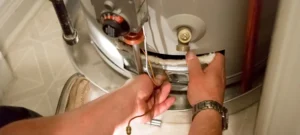
Understanding Water Heater Costs
Water heater costs depend on the type, size, efficiency rating, and installation requirements. Upfront and operating expenses vary significantly based on these factors.
Breaking Down the Price Range
Water heater prices can vary widely, with basic models starting as low as $130.99 and high-end heating systems reaching upwards of $5,500. This range is influenced by several factors:
- The type of water heater (tankless or tank).
- The capacity and efficiency of the unit.
- The brand and quality of materials.
It’s important to consider the initial purchase price alongside the long-term operating costs. While a cheaper unit may save money upfront, it could lead to higher energy bills and maintenance expenses over time.
Factors Influencing Water Heater Prices
The cost of a water heater is not a one-size-fits-all figure. Several factors play a crucial role in determining the final price you’ll pay for a new water heater. Here are some key elements to consider:
- Type of heater: Tankless units generally range from $1,200 to $3,500, while tank water heaters average between $820 and $1,290.
- Fuel source: Electric models can cost between $500 and $1,500, whereas gas heaters may set you back $700 to $2,700. Alternative fuels like propane, oil, and solar have their own price ranges.
- Brand: The manufacturer can significantly impact cost, with prices varying from $180 for some brands to over $2,600 for others.
Remember, these prices typically cover the unit alone and do not include installation fees. Labor costs can vary, with plumbers charging hourly rates to install, especially for whole-home and gas-powered units. Always factor in these additional expenses when budgeting for your water heater.
Comparing Tankless and Tank Water Heater Costs
When weighing the options between tankless and tank water heaters, initial costs and long-term expenses play crucial roles. Tankless water heaters, while more expensive upfront, often lead to lower operating costs over time. Conversely, traditional tank heaters have a lower initial price but can be costlier to run.
- Initial Costs: Tankless units range from $500 to $2,000, with installation adding $150 to $1,500. Tank heaters are cheaper, costing $200 to $1,500, plus $500 to $1,000 for installation.
- Operating Costs: Tankless heaters are more energy-efficient, costing $192 to $540 annually, whereas tank heaters run $225 to $580 per year.
- Longevity: Tankless models typically last longer, which can offset the higher initial investment.
Ultimately, the choice depends on your household’s hot water needs, budget, and long-term savings goals. It’s essential to consider both the immediate financial impact and the expected lifespan of the water heater when making your decision.
Types of Water Heaters and Their Costs
Tank water heaters cost $600-$2,500 on average, while tankless units are $1,200-$3,500. Electric models are cheapest, followed by gas and propane options.
Tankless Water Heaters: An Overview
Tankless water heaters offer a continuous supply of hot water and are known for their energy efficiency. Unlike traditional models with a storage tank, these heaters warm water on demand, eliminating the risk of running out. They are generally more expensive upfront but can lead to long-term savings on utility bills.
- Tankless heaters are 8% to 34% more energy-efficient, as reported by the U.S. Department of Energy.
- They are safer, with less risk of leaks, rust, or bacterial growth compared to tank models.
- With lifespans of 15 to 20 years, they outlast conventional heaters, which typically last 8 to 12 years.
The rising popularity of tankless water heaters is also due to potential tax breaks and energy incentives available in some areas. Their compact size and lower maintenance requirements add to their appeal, making them a worthwhile consideration for homeowners looking to upgrade their hot water systems.
Tank Water Heaters: What to Expect
When considering a tank water heater, anticipate a balance between upfront costs and operational efficiency. Traditional tank water heaters are known for their reliability and straightforward installation. They are typically powered by electricity, gas, or solar energy, and come in various sizes to accommodate different household needs.
- Expect regular maintenance to ensure peak performance and longevity.
- Budget for annual inspections and potential heating repairs.
- Be aware that in colder climates or homes with high water usage, a tank system may be more practical than tankless options.
While the initial investment for a tank water heater might be more manageable, especially for homes with significant water demands, it’s important to consider the long-term energy consumption which can affect overall costs.
Gas, Electric, and Other Fuel Types: Cost Comparison
When choosing a water heater, the fuel type is a significant factor affecting both the initial purchase and ongoing operating costs. Electric water heaters are known for their lower installation costs, ranging from $150 to $1,000 for labor, but they can have higher operating costs, approximately $25 to $45 monthly. In contrast, natural gas heaters require a higher upfront labor cost of $900 to $1,500 but offer lower monthly expenses, around $16 to $22.
Other options include propane and solar-powered water heaters. Propane units fall in the middle, with labor costs similar to natural gas and operating costs between $29 and $40 monthly. Solar options boast the lowest operating costs at $7.50 to $14.50 per month, but the installation can be the most expensive, with labor costs ranging from $2,000 to $4,000.
- Electric: Lower installation, higher monthly costs
- Natural Gas: Higher installation, lower monthly costs
- Propane: Moderate installation and monthly costs
- Solar: Highest installation, lowest monthly costs
Ultimately, the choice depends on your budget, environmental preferences, and the availability of fuel types in your area.
Installation Costs for Water Heaters
Installation averages $960-$3,910, including labor. Costs increase for larger units, complex installations, adding venting/gas lines, and permit fees.

Average Installation Price and What It Includes
The average installation cost for a water heater typically ranges from $900 to $3,000, with a common figure being around $1,400. This price encompasses both labor and the necessary materials for a proper installation. Labor costs can vary widely, with plumbers charging anywhere from $50 to $200 per hour. The duration of the installation process can also affect the total cost, taking between two to ten hours based on the complexity and type of water heater.
Included in the installation costs are:
- Pipes and fittings
- Pipe thread compound
- Pressure release valves
- Solder and venting pipes
- Connectors, and water & gas piping
Materials such as a gas connector kit, termination vent kit, mounting hardware, and a brass valve set can add up to $175, while piping and insulation may cost around $10 per foot. It’s crucial to note that additional expenses may arise for electrician work and permits, ensuring the installation adheres to safety and building codes.
Labor Costs and Hourly Rates for Plumbers
The cost of labor is a significant component of water heater installation. Plumbers typically charge between $75 and $150 per hour, with the total time required ranging from two to ten hours based on the complexity of the job and the type of water heater being installed.
Here’s a breakdown of labor costs by water heater type:
- Electric: $150–$1,000
- Natural gas: $900–$1,500
- Propane: $900–$1,500
- Oil: $1,200–$2,000
- Solar: $2,000–$4,000
Additional materials such as pipes, fittings, and valves may increase the overall cost. In some cases, an electrician may be needed for rewiring, typically costing $50–$100 per hour. It’s essential to factor in both labor and materials when budgeting for your water heater installation.
Additional Installation Considerations
Ensure your installer is licensed and insured to avoid potential legal and financial issues. Installing a water heater involves complex electrical and plumbing work that often requires a professional touch.
- Verify the installer’s credentials and experience with water heater systems.
- Consider the difficulty of the installation; tankless units, for example, may require significant modifications to your home’s existing plumbing and electrical infrastructure.
Obtain multiple estimates from contractors to compare costs and services. Look for professionals with positive reviews and a good track record. Remember to get all agreements in writing, including the estimate, contract, and details of any warranties offered.
The Long-Term Financial Impact of Water Heaters
Energy-efficient models have higher upfront costs but lower operating expenses over their lifespan, potentially saving thousands in utility bills.
Energy Efficiency and Operating Costs
The operating costs of water heaters vary significantly with fuel type. Electric tankless water heaters typically incur monthly expenses between $25 and $45, leading to an annual cost of $300 to $540. In contrast, natural gas models average $16 to $22 monthly, amounting to $192 to $264 per year. Propane units fall in the middle, costing $29 to $40 monthly, or $348 to $480 annually. Solar-powered options offer the lowest operating costs, ranging from $7.50 to $14.50 per month, which translates to $90 to $175 per year.
Energy efficiency not only affects ongoing expenses but can also qualify homeowners for tax incentives and energy rebates. The longevity of tankless water heaters, often over 20 years, further enhances their financial appeal. However, the actual yearly cost to operate a tankless water heater depends on multiple factors, including water usage, local climate, and simultaneous use of multiple appliances, which can increase peak flow rate demands.
Maintenance and Repair Expenses
Regular maintenance is crucial to extend the lifespan of your water heater and ensure it operates efficiently. Expect to incur periodic costs for tasks such as flushing the tank, replacing anodes, and inspecting pressure relief valves. Here’s a breakdown of potential expenses:
- Flushing the tank to remove sediment buildup: $20-$100
- Replacing anode rods to prevent corrosion: $20-$50
- Inspecting and testing pressure relief valves: $20-$30
Unexpected repairs can arise from component failures or system malfunctions. These costs vary widely depending on the severity of the issue and the parts required. For instance, replacing a heating element might cost between $200 and $300, while fixing a leak could be more or less, depending on the damage. It’s wise to set aside a maintenance fund to cover these expenses without financial strain.
Cost-Benefit Analysis of Tankless vs. Traditional Heaters
When weighing the merits of tankless versus traditional water heaters, homeowners must consider both upfront costs and long-term savings. Tankless water heaters, while more costly initially, offer greater energy efficiency and longevity. Traditional tank heaters, on the other hand, have lower initial prices but may lead to higher operating costs over time.
- Energy Efficiency: Tankless heaters are 8%–34% more energy-efficient, reducing long-term utility bills.
- Safety and Maintenance: Tankless systems are less prone to leaks, rust, or bacteria, and require less maintenance.
- Lifespan: Tankless heaters often last 15–20 years, compared to 8–12 years for tank heaters.
However, the higher heating installation cost of tankless heaters can be a significant factor. A detailed cost comparison over a 10-year period shows that while electric tank heaters have a total first-year cost of $1,340–$2,480, electric tankless heaters range from $950–$3,040. Gas models show a similar pattern, with tank heaters costing $975–$2,600 initially versus $1,842–$3,764 for tankless. Ultimately, the decision hinges on whether the immediate investment aligns with the homeowner’s budget and long-term financial goals.
FAQs on Water Heater Installation and Costs
Common FAQs cover ideal tank sizes, associated risks, why costs are high, who installs heaters, and replacement costs for specific sizes.

Common Questions About Tankless Water Heater Installation
How much does it cost to install a tankless water heater? Installation costs for tankless water heaters can vary widely, typically ranging from $1,200 to $3,500. The price fluctuates based on the model and any necessary upgrades such as gas lines or venting systems.
- Is it possible to install a tankless water heater on my own? While some homeowners may consider a DIY approach, it’s crucial to understand that tankless water heater installation is not recommended as a DIY project due to the complexities and safety concerns involved.
- What should I look for in a professional installer? When choosing a contractor, ensure they are licensed, bonded, and insured, especially for gas-powered units. It’s advisable to get estimates from at least three different contractors and to verify their experience with tankless systems.
Remember, a properly installed tankless water heater can lead to significant energy savings over time, making it a worthwhile investment for many homeowners.
Costs Associated with Switching to Tankless Systems
Switching to a tankless water heater involves several cost factors. Expect to invest between $1,200 and $3,500 for the entire conversion process. This includes purchasing the new heater ($500–$2,000), removing and disposing of the old tank ($100–$500), and potential upgrades to your home’s infrastructure such as new electrical outlets ($150–$300) and gas lines ($350–$750).
Here’s a breakdown of typical costs:
- New tankless water heater: $500–$2,000
- Removal of old tank: $100–$500
- Permits: $25–$250
- Electrical outlet upgrades: $150–$300
- Gas line upgrades: $350–$750
- Plumbing updates: $100–$500
- Installation in attic or closet: $75–$150
While tankless systems are more expensive upfront, they can offer long-term savings on operating costs. However, be wary of cutting corners during installation to save money; proper installation by experienced professionals is crucial for safety and efficiency.
Understanding the Estimates and Quotes Process
Navigating the estimates and quotes process for water heater installation is crucial for budgeting and avoiding unexpected costs. Always request detailed quotes from multiple professionals to compare prices and services. Here’s a simple guide to help you understand the process:
- Gather quotes from at least three local experts to ensure competitive pricing.
- Review each quote for a comprehensive breakdown of labor, materials, and any additional fees.
- Check if the quote includes the cost of removing your old water heater, if applicable.
- Confirm whether the estimate is fixed or subject to change based on unforeseen issues during installation.
Remember, a lower quote doesn’t always mean better value. Consider the experience and reputation of the installer, as well as the quality of the water heater unit, when making your decision.
Pros and Cons of Different Water Heater Systems
Tank heaters are cheaper upfront but less efficient. Tankless models are pricier but provide endless hot water and lower energy bills.
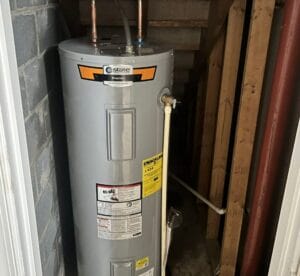
Benefits and Drawbacks of Tankless Water Heaters
Tankless water heaters are gaining traction for their efficiency and space-saving design. They can be 8% to 34% more energy-efficient, reducing utility bills and potentially qualifying for tax incentives. These systems provide a continuous supply of hot water, unlike tank heaters that can deplete. Additionally, they boast a longer lifespan, typically 15-20 years, and present fewer risks of leaks or bacterial growth.
However, the initial cost of a tankless water heater is higher than traditional tank models. While they require less maintenance, the installation can be more complex and costly. Homeowners must weigh these factors:
- Upfront investment vs. long-term savings
- Unlimited hot water supply
- Space-saving benefits
- Potential for tax credits and incentives
Deciding if a tankless water heater is superior involves considering personal needs and financial readiness for the initial expense.
Assessing the Value of Gas Water Heaters
Gas water heaters are a popular choice for many homeowners, with costs typically ranging from $700 to $2,700. The energy efficiency of gas heaters often exceeds 80-85%, making them an attractive option for those looking to reduce their energy bills.
- Gas heaters can heat water quickly and are available in sizes from 20 to 100 gallons.
- Installation may require a gas line upgrade if the existing line cannot supply sufficient BTUs.
When considering a gas water heater, it’s important to factor in the potential need for a gas line hookup and the size that will best meet your household’s needs. The long-term savings in energy costs can make gas heaters a worthwhile investment for many.
Evaluating Water Heater Options for Your Home
Choosing the right water heater is crucial for both comfort and cost-efficiency. Consider your household’s specific needs—including water usage patterns, power sources, and budget constraints. Here are some points to guide your decision:
- Assess the size of your home and the number of occupants. Larger homes or those with more residents may require a more robust system.
- Determine if your home is better suited for an electric or gas water heater. Electric models are easier to install but may not be sufficient for larger homes, while gas models may require an upgraded gas line.
- Think about the climate you live in. In colder regions, a tank water heater might be more reliable to meet heavy usage needs.
Remember, the initial cost is just one factor. Operating costs, maintenance, and energy efficiency will also impact your long-term expenses. Weigh the pros and cons of tankless versus traditional tank heaters, considering both the upfront investment and the expected savings over time.
Factors Affecting Tankless Water Heater Installation Costs
Tankless installation costs increase for larger homes, adding venting/gas lines, electrical work, and if relocating the unit from its existing spot.
Labor and Material Costs Breakdown
The cost of installing a water heater is a combination of labor charges and the price of materials required for the job. Labor costs vary widely, with plumbers charging between $75 and $150 per hour. The total time needed can range from two to ten hours, depending on the complexity of the installation and the type of water heater or type of home heating.
Materials play a crucial role in the overall expense. Essential items include:
- Pipes and fittings
- Pipe thread compound
- Pressure release valves
- Solder and venting pipes
- Connectors
- Water and gas piping
Additional materials may be necessary for tankless systems, such as cabinets for the heater or extra insulation for outdoor pipes. The type of water heater, whether electric, natural gas, propane, oil, or solar, also influences the material costs, which can range from $150 for basic electric installations to $4,000 for sophisticated solar setups. Installations in challenging locations, like crawl spaces, can further increase labor costs.
Complexity of Installation and Its Financial Implications
The complexity of installing a water heater can significantly affect the overall cost. Professional installation ensures compliance with safety regulations and proper functioning. Here are some factors that contribute to the complexity:
- Type of water heater (tankless, gas, electric, etc.)
- Accessibility of the installation site
- Modifications needed for existing plumbing and electrical systems
- Local building codes and permits
Labor costs vary, with plumbers charging between $75 to $150 per hour. The time required can range from two to ten hours, influenced by the water heater type and installation complexity. Materials such as pipes, fittings, and venting pipes also add to the cost. It’s crucial to budget for these variables to avoid unexpected expenses.
How to Budget for Your Water Heater Installation
Budgeting for a water heater installation requires a clear understanding of the costs involved. Start by setting aside a range from USD 900 to USD 3,000, which covers the average installation expenses. This range typically centers around USD 1,400 but can vary based on several factors.
To ensure you’re prepared, consider the following:
- Labor costs, with plumbers charging between USD 50 to USD 200 per hour.
- The price of materials such as pipes, fittings, and valves, which are essential for the installation.
- Additional services like electrician work, which may cost USD 50 to USD 150 per hour.
Remember, the complexity of the installation can increase the demand for materials and labor, thus raising the overall cost. It’s wise to allocate extra funds for unforeseen expenses to avoid budget shortfalls.
Choosing the Right Water Heater for Your Home
Consider household size, hot water demands, fuel type availability, upfront budget, and long-term energy costs when selecting the ideal water heater.
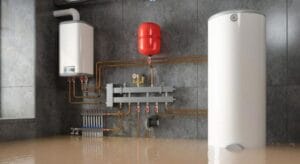
Assessing Your Household’s Hot Water Needs
Determining the right water heater for your home hinges on understanding your hot water needs. Consider the number of people in your household and your daily water usage patterns. For instance, a household with 3-4 people typically requires a water heater that can deliver an adequate first hour rating, often around 57 gallons.
Evaluate your specific requirements by considering the following:
- Shower and bathtub flow rates, usually measured in gallons per minute.
- The desired temperature setting for your water tank.
- The average air temperature in your location, which can affect water heating efficiency.
Remember, an energy-efficient model not only meets your hot water needs but also saves on operating costs. If you’re in a colder climate with heavy water usage, a standard tank water heater might be more suitable, while others might benefit from a tankless system. Use a buyer’s guide or consult with professionals to match the best model to your home’s demands.
Matching with Local Experts for Your Project
Finding the right professional for your water heater installation is crucial. Share details about your project to get matched with local experts. Here’s how to streamline the process:
- Outline your specific needs and preferences for the water heater installation.
- Use online platforms like Angi to quickly connect with highly-rated local pros.
- Review and compare quotes to ensure you choose the best professional for the job.
Remember, a successful match with a skilled installer can lead to a smoother project and better results. Take the time to vet your options and make an informed choice.
Making an Informed Decision on Water Heater Purchase
Choosing the right water heater is crucial for both comfort and cost-efficiency in your home. Assess your household’s hot water needs carefully, considering daily usage, peak demand, and the size of your home. Here are some steps to guide you:
- Evaluate whether a tankless or tank water heater suits your lifestyle and budget.
- Consider the fuel type—electric, natural gas, or propane—based on availability and energy costs in your area.
- Factor in the climate you live in; colder regions may influence the efficiency of your water heater.
Remember, while upfront costs are important, think about long-term savings. Tankless water heaters may have higher initial costs but can offer energy savings over time. Conversely, traditional tank heaters might fit a limited budget but could have higher operating costs. Always consult with a professional to understand the full scope of installation and maintenance expenses. Making a well-informed decision now will lead to years of reliable hot water and potential savings.
Expert Insights on Water Heater Costs
Plumbers recommend getting permits, weighing tank vs tankless pros/cons, and understanding venting needs to ensure proper installation and avoid extra fees.
Research and Reviews from Industry Professionals
Industry professionals provide valuable insights into water heater costs, often backed by extensive research and data analysis. Arizton’s reports, for example, are frequently cited for their depth and reliability, offering a comprehensive view of market trends and consumer preferences.
Key takeaways from industry reports include:
- Market size and growth projections
- Consumer behavior and purchasing patterns
- Competitive landscape and key players
These reports are instrumental for stakeholders looking to make informed decisions, whether for investment, product development, or strategic planning. With a commitment to customer satisfaction and a wealth of exclusive data, firms like Arizton have become trusted sources for industry intelligence.
Cost Guides and What They Mean for You
Cost guides offer a comprehensive overview of market trends and pricing forecasts, essential for making informed decisions. They translate complex data into actionable insights, helping you understand the financial landscape of water heater systems.
- Industry reports detail growth potential and competitive market share.
- Price trends provide a snapshot of current and future costs.
- Regional outlooks inform on location-specific pricing variations.
By reviewing these guides, you can gauge the average investment required for different water heater systems and anticipate changes in the market. This knowledge positions you to negotiate better deals and budget more effectively for your project.
Our Conclusion: Is a Tankless Water Heater Worth It?
In conclusion, tankless water heaters offer long-term savings and efficiency despite their higher initial costs. They are a significant investment upfront but can lead to energy savings and a consistent supply of hot water. Here are key points to consider:
- Tankless units typically have a longer lifespan than traditional tank heaters.
- They require less space and maintenance over time.
- Unlimited hot water supply is a major advantage for households with high usage.
However, they may not be the best fit for every home. It’s crucial to evaluate your household’s hot water needs, energy savings goals, and budget before making a decision. Consulting with a professional installer can provide personalized insights and help ensure a proper installation, which is key to maximizing the benefits of a tankless water heater.
Conclusion
In summary, the cost of a water heater encompasses not only the price of the unit itself but also the installation and potential operational expenses. With a typical price range of $1,200 to $3,500 for tankless water heaters and $820 to $1,290 for tank water heaters, homeowners must consider their specific needs and the type of heater that best suits their situation. Installation costs, influenced by labor rates and the complexity of the job, can significantly affect the overall investment. It’s crucial to weigh the initial costs against the long-term benefits, such as energy savings with tankless models. Ultimately, consulting with local professionals and obtaining detailed quotes will provide the most accurate estimate for your water heater project.



